Thesaurus : Doctrine

► Full Reference: L. d'Avout, "Compliance and conflict of laws. International Law of Vigilance-Conformity, based on recent applications in Europe", in M.-A. Frison-Roche (ed.), Compliance Obligation, Journal of Regulation & Compliance (JoRC) and Bruylant, "Compliance & Regulation" Serie, to be published
____
📘read a general presentation of the book, Compliance Obligation, in which this article is published
____
► Summary of the article (done by the Author, translated by the Journal of Regulation & Compliance - JoRC): In the absence of constraints derived from the real international law, vigilance-compliance laws themselves determine their scope of application in space. They do so generously, to the extent that they often converge on the same operators and 'overlap' on the world stage. The result is a hybridation of the law applicable to the definition of Compliance Obligations; a law possibly written "with four hands" or more, which is not always harmonious and which exposes unilateral legislators to occasional retouching their work and their applied regulations.
____
🦉This article is available in full text to those registered for Professor Marie-Anne Frison-Roche's courses
________
Thesaurus : Doctrine
► Référence complète : M. Brochier & S. Darrois, "Les potentielles actions judiciaires en matière d’information extra-financière", Banque & Droit, n°216, juillet-août 2024, pp.10-12
____
► Résumé de l'article (fait par MAFR) : Les auteurs partent d'un constat : la multiplication des obligations pesant sur les entreprises en matière d’information extra-financière, laquelle entraîne mécaniquement une multiplication des potentiels faits générateurs de responsabilité de ces entreprises. Dans le même temps, bien qu'ils constatent pour l'heure une absence de procès en la matière, ils mettent l'accent sur le nid à contentieux que pourraient constituer ces règles.
À cet égard, les auteurs mettent en avant le risque d'instrumentalisation de ces actions en responsabilité, tantôt par des "acteurs de la société civile", tantôt par des actionnaires minoritaires ou dits "activistes", les uns et les autres cherchant à peser sur la gestion de la société. Ils relèvent également que les émetteurs d'information extra-financière pourraient être amenés à agir en responsabilité contre les agences de notation RSE, champ d'activité pour l'heure relativement peu réglementé alors même qu'il peut avoir des conséquences considérables pour l'entreprise.
Ils concluent sur l'importance de l'information. Si l'information, en l'occurence extra-financière, est bien sûr l'objet des règles évoquées, ils relèvent qu'en cas de crise et face au risque de réputation la seule solution efficace est de communiquer rapidement au public une information claire, fiable et intelligible. Ils soulignent enfin que cette transparence demandée aux grandes entreprises quant à leur impact sur leur environnement est la contrepartie de leur puissance.
____
🦉Cet article est accessible en texte intégral pour les personnes inscrites aux enseignements de la Professeure Marie-Anne Frison-Roche
________
Thesaurus : Doctrine
► Référence complète : B. Lecourt, "Des obligations d'information en matière de droit de l'homme et d'environnement au devoir de vigilance", in B. Lecourt (dir.) Lebvre - Dalloz, coll. "Thèmes et commentaires", 2025, pp
____
📗lire une présentation générale de l'ouvrage, Le devoir européen de vigilance, dans lequel cet article est publié
____
🦉Cet article est accessible en texte intégral pour les personnes inscrites aux enseignements de la Professeure Marie-Anne Frison-Roche
________
Sept. 4, 2025
Thesaurus : Doctrine

► Full Reference: L. d'Avout, "Compliance et conflits de lois. Le droit international de la vigilance-conformité à partir de quelques applications récentes sur le continent européen" ("Compliance and conflict of laws. International Law of Vigilance-Conformity, based on recent applications in Europe"), in M.-A. Frison-Roche (dir.), L'Obligation de Compliance, Journal of Regulation & Compliance (JoRC) and Dalloz, coll. "Régulations & Compliance", 2025, to be published.
____
📕read the general presentation of the book, L'obligation de Compliance, in which this article is published
____
► English Summary of this Article (done par the Author) : In the absence of constraints derived from the real international law, vigilance-compliance laws themselves determine their scope of application in space. They do so generously, to the extent that they often converge on the same operators and 'overlap' on the world stage. The result is a hybridisation of the law applicable to the definition of Compliance Obligations; a law possibly written "with four hands" or more, which is not always harmonious and which exposes unilateral legislators to occasional retouching their work and their applied regulations.
________

Updated: Feb. 25, 2025 (Initial publication: Nov. 8, 2023)
Publications

🌐follow Marie-Anne Frison-Roche sur LinkedIn
🌐subscribe to the Newsletter MAFR Regulation, Compliance, Law
🌐subscribe to the Video Newsletter MAFR Surplomb / Overhang
____
 ► Full Reference: M.-A. Frison-Roche, Vigilance, the cutting edge and a full part of the Compliance Obligation, Working Paper, November 2023
► Full Reference: M.-A. Frison-Roche, Vigilance, the cutting edge and a full part of the Compliance Obligation, Working Paper, November 2023
____
📝 This Working Paper is the basis of the article, "La Vigilance, pointe avancée et part totale de l'Obligation de Compliance" (Vigilance, the cutting edge and a full part of the Compliance Obligation), published in 📕L'Obligation de Compliance
____
► Summary of this Working Paper: The "duty of vigilance" unleashes all the more radical and passionate positions, sometimes among Law professors, because it has not been precisely defined. One word is used for another, either inadvertently or deliberately, deliberately if it can attract this or that element from one legal corpus and import it into another. The very exercise of definition is therefore required in practice. There are specific obligations of vigilance that come under such and such a body of regulations and are imposed on such and such a category of operators to fulfill such and such a function. These are precise circles which are not confused and must not be confused. This is superimposed on what the French 2017 law so-called "Vigilance law", which is much more encompassing since it applies to all large companies in the operation of the value chains they have set up. The European 2024 directive is in the same way. But there is no general duty or obligation of Vigilance. Such a claim would be based on confusing or shifting each of these 3 levels, which must be avoided because no positive law does support this (I).
If the duty of vigilance is attracting so much attention, whether or not the European CS3D is fully effective, it is because Vigilance is the "cutting edge" of Compliance Obligation (II). Vigilance requires companies, by consideration of their power and without reproaching them for it or demanding that it be reduced, to detect risks of damage to the environment and climate, but also to human rights, because they are in a position to do so in order to prevent them from turning into disasters. In this respect, the Vigilance duty makes clearer the exact legal nature of the Compliance Obligation.
Moreover, Vigilance appears as the Total Part of the Compliance Obligation (III). Indeed, although it is restricted to one area, the value chain, and to two types of risk, deterioration of the environment and deterioration of human rights, it expresses the totality of the Compliance Obligation by means of tools that the 2017 French "Vigilance law" had itself duplicated from the 2016 so-called "Sapin 2 law": to preserve systems today, but above all tomorrow, in order they do not collapse (Negative Monumental Goals), or even consolidate them (Positive Monumental Goals), so that the human beings who are willingly or unwillingly involved in them are not crushed by them but benefit from them. This is why large companies are subject to the Obligation of Compliance and Vigilance, particularly in the humanist conception that Europe is developing.
The result is a new type of Litigation, of a systemic nature, for which the Courts have spontaneously become specialised, and for which the procedures will have to be adapted and the office of the Judge shall have to evolve.
_____
🔓read the developments below⤵️
Oct. 21, 2024
Thesaurus : Doctrine
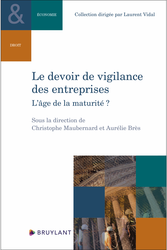
► Référence complète : Ch. Maubernard & A. Brès (dir.), Le devoir de vigilance des entreprises. L'âge de la maturité ?, Bruxelles, Bruylant, coll. "Droit & Économie", 258 p.
____
____
📗lire le sommaire de l'ouvrage
____
📗lire la table des matières de l'ouvrage
____
► Présentation de l'ouvrage (fait par l'éditeur) : "L’adoption par le Parlement européen et le Conseil le 13 juin 2024 de la directive (UE) 2024/1760 sur le devoir de vigilance des entreprises en matière de durabilité constitue une étape décisive dans la prise en compte de la responsabilité sociétale des entreprises. Cette nouvelle législation européenne imposera aux entreprises qui entrent dans son champ d’application et qui agissent au sein du marché intérieur, y compris les entreprises étrangères, de se doter d’outils de vigilance afin de mettre un terme ou à tout le moins de limiter les incidences négatives que pourraient avoir leurs activités et celles de leurs partenaires sur la protection des droits de l’homme, de l’environnement et désormais de la lutte contre le changement climatique.
C’est à la suite de la proposition de la Commission européenne visant à faire adopter ce texte, qu’un colloque a été organisé à la Faculté de Droit et de Science politique de Montpellier en mai 2023. L’ouvrage est le résultat de ces fructueux échanges qui ont permis à d’éminents spécialistes, tant universitaires que de la vie des affaires et du monde associatif, de réfléchir aux incidences de cette nouvelle législation. Cet éclairage pluridisciplinaire a permis, en effet, de s’interroger sur l’articulation de la législation de l’Union européenne avec les législations nationales existantes (et en premier lieu la loi française de 2017) mais aussi, plus largement, sur le sens du devoir de vigilance.
L’ouvrage s’adresse ainsi aussi bien aux chercheurs intéressés par ces questions, qu’aux étudiants de Master et aux professionnels du Droit qui seront en première ligne pour accompagner les entreprises soumises au devoir de vigilance à se conformer à leurs obligations nouvelles.".
____
📝consulter une présentation de l'article de Marie-Anne Frison-Roche : "Devoir de vigilance : progresser"
________
Oct. 21, 2024
Publications

🌐follow Marie-Anne Frison-Roche on LinkedIn
🌐subscribe to the Newsletter MAFR. Regulation, Compliance, Law
🌐s'abonner à la Newsletter Surplomb, par MAFR
____
► Full Reference: M.-A. Frison-Roche, "Devoir de vigilance : progresser" ("Duty of Vigilance: the Way Forward"), in Ch. Maubernard & A. Brès (eds.), Le devoir de vigilance des entreprises. L'âge de la maturité ? (The duty of vigilance. The age of maturity?), Bruylant, "Droit & Economie" Serie, 2024, pp. 221-251
____
📝read the article (in French)
____
🚧 read the bilingual Working Paper which is the basis of this article, with additional developments, technical references and hyperlinks
____
► English Summary of the article: In 2017 in France the so-called Vigilance law expressed great ambition. So did the draft directive. But in 2024 the European institutions moderated this ambition by refusing to increase either the type of companies subject and the constraints to which the duty of vigilance is associated. The directive has essentially halted what was for some the "march of progress". Does the ambition no longer exist? Does the future lie in an extension of the philosophy of the duty of vigilance, i.e. companies that should always be more concerned about others? This would undoubtedly be reaching the "age of maturity", where others see the age of madness, because it would be a contradiction in terms to ask a company to be concerned about anything other than its own development.
It is therefore appropriate to consider this very hypothesis of an "age of maturity" as being an ambition maintained despite a European directive which, in its adopted version, is weakened and while the oppositions are intact (I). First of all, it must be admitted that the notion of "maturity" most often conceals a value judgment when applied to a legal concept (I.A.) and that this is blatantly obvious with regard to the duty of vigilance, which is considered by some and by nature by some as a good and by others as an evil (I.B).
In order not to remain in what appears to be trench warfare, we must not get too bogged down in the reference French legislation of 2017 and what appears to be a European stutter in 2024, arguing so loudly that we can hear them reasoning in print, by paying attention to less visible and now more promising avenues of progress (II). In fact, the duty of vigilance can progress simply by the passage of time (II.A), by a better definition of the vocabulary (II.B), by the consolidation of the principles of Responsibility and Dialogue (II.C), by the uniqueness of the jurisdictional route (II.D).
This last perspective of the progress that will be made possible in France by the uniqueness of the judicial route leads to a final avenue of progress. By their very nature, laws are jolts, all the more violent for being disputed. At the moment, if we want to make progress, these two other sources - the contract and the judge - must be favoured (III). The European directive is rightly concerned with access to the courts and takes a measured view of the effectiveness of contracts as a means of making the duty of vigilance effective, with the courts having to ensure that the contract does not destroy the spirit of the system. This is what the law already organises about the relationship between the contract, the judge and the duty of compliance (III.A). What is new in Europe in 2024 is the introduction of a Supervisor (III.B). Here again, vigilance is the "cutting edge" of Compliance Law, as it is an extension of Regulatory Law.
The result is that, through interpretation and the handling of principles, and to formulate a more general conclusion, it is the judge who holds and will hold the balance of the duty of vigilance.
________

Sept. 27, 2024
MAFR TV : MAFR TV - Overhang

🌐suivre Marie-Anne Frison-Roche sur LinkedIn
🌐s'abonner à la Newsletter MAFR. Regulation, Compliance, Law
🌐s'abonner à la Newsletter Surplomb, par MAFR
____
► Référence complète : M.-A. Frison-Roche, "La durabilité, coeur dynamique de la Régulation et de la Compliance", in série de vidéos Surplomb, 27 septembre 2024
____
🌐visionner sur LinkedIn cette vidéo de la série Surplomb
____
____
🎬visionner ci-dessous cette vidéo de la série Surplomb⤵️
____
Surplomp, par mafr
la série de vidéos dédiée à la Régulation, la Compliance et la Vigilance
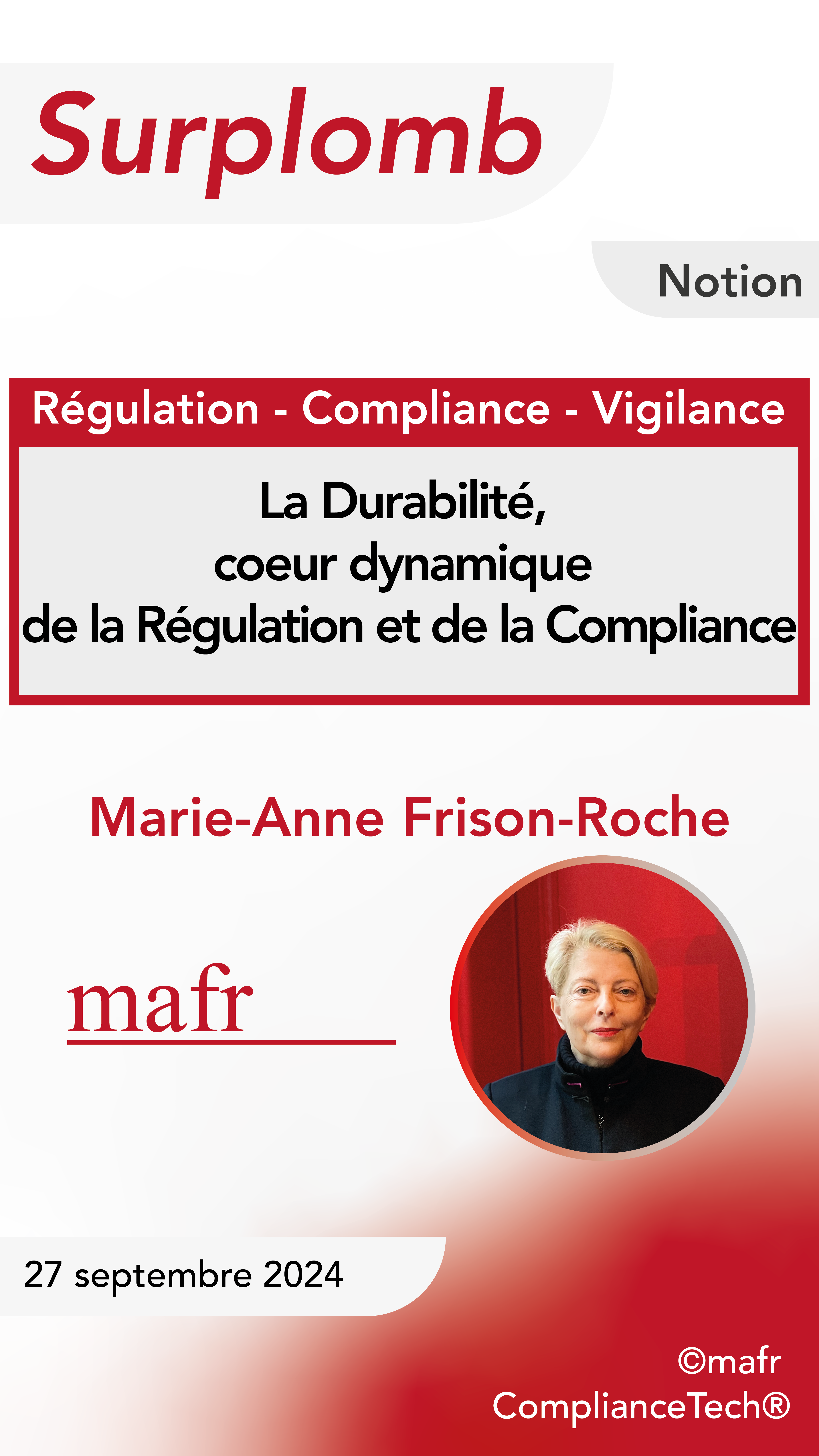


Sept. 25, 2024
Organization of scientific events
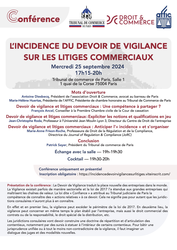
🌐follow Marie-Anne Frison-Roche on LinkedIn
🌐subscribe to the Newsletter MAFR Regulation, Compliance, Law
____
► Full Reference: M.-A. Frison-Roche, coordination of the conference L'incidence du devoir de vigilance sur les litiges commerciaux (The impact of the duty of vigilance on commercial litigation), Tribunal de commerce de Paris (Paris Commercial Court), Droit & Commerce and Association Française en Faveur de l'Institution Consulaire (AFFIC), Tribunal de commerce de Paris, 25 September 2024, 5.15p.m. to 8p.m.
____
🧮see the full programme of this event
____
🌐consult on LinkedIn a general présentation of this event (in French)
____
► General presentation of the conference: The Duty of Vigilance reflects the new role of firms in the world. Vigilance sometimes existed on a sectoral basis, but the 2017 French law extended it to large companies that control value chains. The French so-called "confiance" law gave the Tribunal judiciaire de Paris (Paris First Instance Civil Court) jurisdiction to hear "actions relatives" ("actions relating") to this duty. This does not mean, however, that the commercial courts will no longer have jurisdiction.
Firstly, vigilance may go beyond the scope of the 2017 French law. Secondly, vigilance may concern not only the plan drawn up by the firm, but also Commercial Contract Law or Liability Law, special Distribution Law, etc.
Commercial courts will have to develop a doctrine for dividing up and coordinating disputes, in particular by staying proceedings within certain disputes. To build a unified or at least non-contradictory case law on vigilance, we need to imagine a dialogue between judges and new procedures.
____
🧮Programme of this event:
L'INCIDENCE DU DEVOIR DE VIGILANCE SUR LES LITIGES COMMERCIAUX
(THE IMPACT OF THE DUTY OF VIGILANCE ON COMMERCIAL LITIGATION)
Paris First Instance Commercial Court, room 1
🕰️5.15pm.-5.30pm. Welcome
🕰️5.30pm.-5.40pm. 🎤Mots d'ouverture (Opening words), by 🕴️Antoine Diesbecq, President of Droit & Commerce, attorney at the Paris Bar and 🕴️Marie-Hélène Huertas, President of AFFIC, Honorary President of Chamber of the Paris First Instance Commercial Court
🕰️5.40pm.-6pm. 🎤Devoir de vigilance et litiges commerciaux : Une compétence à partager ? (Duty of Vigilance and Commercial Litigation: A jurisdiction to share?), by 🕴️François Ancel, Judge at the Première Chambre civile de la Cour de cassation (First Civil Chamber of the French Court of cassation)
🕰️6pm.-6.20pm. 🎤Devoir de vigilance et litiges commerciaux : Expliciter les notions et qualifications en jeu (Duty of Vigilance and Commercial Litigation: Explain the concepts and qualifications involved?), by 🕴️Jean-Christophe Roda, Full Professor at Jean Moulin Lyon 3 University, Director of the Centre de Droit de l’entreprise
🕰️6.20pm.-6.40pm. 🎤Devoir de vigilance et litiges commerciaux : Anticiper l''incidence" et s’organiser (Duty of Vigilance and Commercial Litigation: Anticipating the "impact" and getting organised), by 🕴️Marie-Anne Frison-Roche, Professor of Regulatory Law and Compliance Law, Director of the Journal of Regulation & Compliance (JoRC)
🕰️6.40pm.-7pm. 🎤Conclusion (Conclusion), by 🕴️Patrick Sayer, President of the Tribunal de commerce de Paris (Paris First Instance Commercial Court)
🕰️7pm.-7.30pm. Discussion with the audience
🕰️7.30pm.-8pm. Cocktail
________
Sept. 9, 2024
Conferences
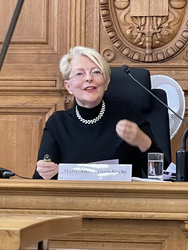
🌐follow Marie-Anne Frison-Roche on LinkedIn
🌐subscribe to the Newsletter MAFR Regulation, Compliance, Law
____
► Full Reference: M.-A. Frison-Roche, "Pourquoi les textes et la pratiques sur le rapport de durabilité vont engendrer un Contentieux Systémique" ("Why the texts and practices on sustainability reporting will give rise to Systemic Litigation"), in Le rapport de durabilité : obligation et Contentieux Systémiques Émergents (The Sustainability Report: Emerging Systemic Obligation and Litigation), in cycle of conference-debates "Contentieux Systémique Émergent" ("Emerging Systemic Litigation"), organised on the initiative of the Cour d'appel de Paris (Paris Cour of Appeal), with the Cour de cassation (French Court of cassation), the Cour d'appel de Versailles (Versailles Court of Appeal), the École nationale de la magistrature - ENM (French National School for the Judiciary) and the École de formation des barreaux du ressort de la Cour d'appel de Paris - EFB (Paris Bar School), under the scientific direction of Marie-Anne Frison-Roche, September 19, 2024, 11h-12h30, Cour d'appel de Paris, Cassin courtroom
____
🧮see the full programme of this event
____
► English summary of the conference: Systemic Litigation refers to a specific category whose proposed category in 2021 refers to "cases" brought before the courts, sometimes specialised, sometimes under ordinary law courts: these are cases in which not only are the parties involved in their dispute but also a system is itself involved, with the procedure and the judge having to allow the interests of the system to be taken into consideration.
However, what is also the subject of new terminology, namely the "Sustainability Report", reflects the same legal revolution: the company must be able to assess not only its economic and financial performance, which is the subject of accounting, but also its development in terms of what it does externally in terms of ESG and what the outside world does about it.
In this perspective, the whole Information System is being transformed, and in different ways depending on the standards adopted, in the United States, Europe or elsewhere, either it is sufficient to obtain Information, no more, so that third parties can adjust their behaviour, mainly investments, or, as in Europe, Law includes a more substantial perspective, so that the company itself adjusts its own behaviour, its Governance, its position in the world, in a renewed relationship with its stakeholders. In Europe, saying and doing are intertwined, CSRD being twinned with CS3D.
Moreover, we can therefore consider that non-financial information, through the sustainability report, its assurance of credibility and the regulation of the audit carried out on it, is itself a system.
The sustainability report, inside the sustainability system, is then interwoven with other systems, which are themselves the subject of Emerging Systemic Litigation: firstly Vigilance, which has been studied as a field of systemic litigation, and then artificial intelligence field, which has been studied in the same way.
The Sustainability Report, insofar as it intersects with the sustainability obligation implied by the duty of Vigilance, may be attracted to the Systemic Litigation to which Vigilance gives rise. In the same way, algorithms can be a tool for data accumulating and matching ESG criteria, which could have the same attraction effect. If this happens, this dimension will have to be present and understood, for example through amici curiae mechanism, in conjunction with the Regulators and the professions concerned.
In addition, as in any emerging mechanism, and as we have seen for example in relation to rating agencies, Tort Law may interfere if the liability of either the company or the person who carried out the audit were to be appreciated, the systemic perspective then having to be integrated into the handling of the case, even before the non-specialised judge.
________

Updated: July 8, 2024 (Initial publication: Dec. 15, 2023)
Publications

🌐follow Marie-Anne Frison-Roche on LinkedIn
🌐subscribe to the Newsletter MAFR Regulation, Compliance, Law
____
 ► Full Reference: M.-A. Frison-Roche, Duty of vigilance: the way forward, Working Paper, December 2023/July 2024.
► Full Reference: M.-A. Frison-Roche, Duty of vigilance: the way forward, Working Paper, December 2023/July 2024.
____
🎤 This working paper has been drawn up to serve as a basis for the conclusions of the colloquium Le devoir de vigilance: l'âge de la maturité? ("The duty of vigilance: the age of maturity?") organised by the University of Montpellier on 25 May 2023.
_____
📝 Updated and developed, it serves as the basis for the article that concludes the book Le devoir de vigilance des entreprises : l'âge de la maturité? ("The duty of vigilance: the age of maturity?"), Editions Bruylant, 2024.
____
► Working Paper summary: In 2017 in France the so-called Vigilance law expressed great ambition. So did the draft directive. But in 2024 the European institutions moderated this ambition by refusing to increase either the type of companies subject and the constraints to which the duty of vigilance is associated. The directive has essentially halted what was for some the "march of progress". Does the ambition no longer exist? Does the future lie in an extension of the philosophy of the duty of vigilance, i.e. companies that should always be more concerned about others? This would undoubtedly be reaching the "age of maturity", where others see the age of madness, because it would be a contradiction in terms to ask a company to be concerned about anything other than its own development.
It is therefore appropriate to consider this very hypothesis of an "age of maturity" as being an ambition maintained despite a European directive which, in its adopted version, is weakened and while the oppositions are intact (I). First of all, it must be admitted that the notion of "maturity" most often conceals a value judgment when applied to a legal concept (I.A.) and that this is blatantly obvious with regard to the duty of vigilance, which is considered by some and by nature by some as a good and by others as an evil (I.B).
In order not to remain in what appears to be trench warfare, we must not get too bogged down in the reference French legislation of 2017 and what appears to be a European stutter in 2024, arguing so loudly that we can hear them reasoning in print, by paying attention to less visible and now more promising avenues of progress (II). In fact, the duty of vigilance can progress simply by the passage of time (II.A), by a better definition of the vocabulary (II.B), by the consolidation of the principles of Responsibility and Dialogue (II.C), by the uniqueness of the jurisdictional route (II.D).
This last perspective of the progress that will be made possible in France by the uniqueness of the judicial route leads to a final avenue of progress. By their very nature, laws are jolts, all the more violent for being disputed. At the moment, if we want to make progress, these two other sources - the contract and the judge - must be favoured (III). The European directive is rightly concerned with access to the courts and takes a measured view of the effectiveness of contracts as a means of making the duty of vigilance effective, with the courts having to ensure that the contract does not destroy the spirit of the system. This is what the law already organises about the relationship between the contract, the judge and the duty of compliance (III.A). What is new in Europe in 2024 is the introduction of a Supervisor (III.B). Here again, vigilance is the "cutting edge" of Compliance Law, as it is an extension of Regulatory Law.
The result is that, through interpretation and the handling of principles, and to formulate a more general conclusion, it is the judge who holds and will hold the balance of the duty of vigilance.
____
🔓read the Working Paper below⤵️
July 4, 2024
Thesaurus : Doctrine
► Référence complète : S. Schiller, "La directive sur le devoir de vigilance. Appréciation du champ d’application, des obligations imposées et des sanctions au regard de la loi française", JCP E, n°27, 4 juillet 2024, étude 1207, pp. 16-26
____
► Résumé de l'article (fait par l'auteure) : "Après 3 années de débats, la directive sur le Devoir de vigilance des entreprises en matière de durabilité a été adoptée par les parlementaires européens le 24 avril 2024. Texte de compromis, il contient des avancées majeures vers plus de sécurité, de fraternité et d’égalité. Vu la richesse de ce texte, seuls quelques points seront abordés dans cette étude : tout d’abord les entreprises concernées, puis les obligations imposées et, enfin, les sanctions prévues. La mise en perspective avec la loi vigilance applicable depuis 7 ans permet de mesurer l’importance de ce nouveau texte, même si de nombreux points sont en sus- pens dans l’attente de la transposition.".
____
🦉Cet article est accessible en texte intégral pour les personnes inscrites aux enseignements de la Professeure Marie-Anne Frison-Roche
________
July 1, 2024
Thesaurus : Doctrine
► Référence complète : M. Tirel, "Publication de la directive CS3D : consécration du devoir de vigilance européen", Dr. sociétés, n°7, juillet 2024, comm. 101, pp. 37-40
____
► Résumé (fait par l'auteure) : "Objet. – Après son adoption définitive par le Parlement européen et le Conseil le 24 mai dernier (avec 17 votes pour et 10 abstentions), la directive sur le devoir de vigilance (Corporate sustainability due diligence directive, dite CS3D), a été publiée au JOUE le13 juin 2024.
Portée. – Tel que l'ambitionnait la Commission européenne, ce texte s'inspire de la loi française du 27 mars 2017 tout en remédiant à certaines de ses lacunes, bien que les ambitions premières que le texte portait ont été nettement revues à la baisse.".
____
🦉Cet article est accessible en texte intégral pour les personnes inscrites aux enseignements de la Professeure Marie-Anne Frison-Roche
________
May 29, 2024
Editorial responsibilities : Direction of the collection Compliance & Regulation, JoRC and Bruylant

🌐follow Marie-Anne Frison-Roche on LinkedIn
🌐subscribe to the Newsletter MAFR Regulation, Compliance, Law
____
► Full Reference: M.-A. Frison-Roche (ed.), Compliance Obligation, Journal of Regulation & Compliance (JoRC) and Bruylant, "Compliance & Regulation" Serie, to be published
____
📕In parallel, a book in French L'Obligation de compliance, is published in the collection "Régulations & Compliance" co-published by the Journal of Regulation & Compliance (JoRC) and Dalloz.
____
📚This book is inserted in this series created by Marie-Anne Frison-Roche for developing Compliance Law.
read the presentations of the other books of this Compliance Series:
- further books:
🕴️M.A. Frison-Roche (dir.), 📘Le système probatoire de la compliance, 2025
- previous books:
🕴️M.A. Frison-Roche (ed), 📘Compliance Juridictionnalisation, 2023
🕴️M.A. Frison-Roche (ed), 📘Compliance Monumental Goals, 2022
🕴️M.-A. Frison-Roche (ed.), 📘Compliance Tools, 2021
____
► go to the general presentation of this 📚Series Compliance & Regulation, conceived, founded et managed by Marie-Anne Frison-Roche, co-published par the Journal of Regulation & Compliance (JoRC) and Bruylant.
____
🧮the book follows the cycle of colloquia 2023 organised by the Journal of Regulation & Compliance (JoRC) and its Universities partners.
____
► general presentation of the book: Compliance is sometimes presented as something that cannot be avoided, which is tantamount to seeing it as the legal obligation par excellence, Criminal Law being its most appropriate mode of expression. However, this is not so evident. Moreover, it is becoming difficult to find a unity to the set of compliance tools, encompassing what refers to a moral representation of the world, or even to the cultures specific to each company, Compliance Law only having to produce incentives or translate this ethical movement. The obligation of compliance is therefore difficult to define.
This difficulty to define affecting the obligation of compliance reflects the uncertainty that still affects Compliance Law in which this obligation develops. Indeed, if we were to limit this branch of law to the obligation to "be conform" with the applicable regulations, the obligation would then be located more in these "regulations", the classical branches of Law which are Contract Law and Tort Law organising "Obligations" paradoxically remaining distant from it. In practice, however, it is on the one hand Liability actions that give life to legal requirements, while companies make themselves responsible through commitments, often unilateral, while contracts multiply, the articulation between legal requirements and corporate and contractual organisations ultimately creating a new way of "governing" not only companies but also what is external to them, so that the Monumental Goals, that Compliance Law substantially aims at, are achieved.
The various Compliance Tools illustrate this spectrum of the Compliance Obligation which varies in its intensity and takes many forms, either as an extension of the classic legal instruments, as in the field of information, or in a more novel way through specific instruments, such as whistleblowing or vigilance. The contract, in that it is by nature an Ex-Ante instrument and not very constrained by borders, can then appear as a natural instrument in the compliance system, as is the Judge who is the guarantor of the proper execution of Contract and Tort laws. The relationship between companies, stakeholders and political authorities is thus renewed.
____
🏗️general construction of the book
The book opens with a double Introduction. The first, which is freely accessible, is a summary of the book, while the second, which is substantial, deals with the future development of the compliance obligation in a borderless economic system.
The first part is devoted to the definition of the Compliance Obligation.
The second part presents commitments and contracts, in certain new or classic categories, in particular public contracts, and compliance stipulations, analysed and qualified regarding Compliance Law and the various relevant branches of Law.
The third part develops the responsibilities attached to the compliance obligation.
The fourth part refers to the institutions that are responsible for the effectiveness, efficiency, and efficacy of the compliance obligation, including the judge and the international arbitrator.
The fifth part takes the Obligation or Duty of Vigilance as an illustration of all these considerations.
____
TABLE OF CONTENTS
COMPLIANCE OBLIGATION : OVERVIEW
Section 1 ♦️ Main Aspects of the Book L'Obligation de Compliance, by 🕴️Marie-Anne Frison-Roche
Section 2 ♦️ Conceiving the unicity of the Compliance Obligation without diluting it, by 🕴️Marie-Anne Frison-Roche
TITLE I.
IDENTIFYING THE COMPLIANCE OBLIGATION
CHAPTER I: NATURE OF THE COMPLIANCE OBLIGATION
Section 1 ♦️ Will, Heart and Calculation, the three marks surrounding the Compliance Obligation, by 🕴️Marie-Anne Frison-Roche
Section 2 ♦️ Debt, as the basis of the compliance obligation, by 🕴️Bruno Deffains
Section 3 ♦️ Compliance Obligation and Human Rights, by 🕴️Jean-Baptiste Racine
Section 4 ♦️ Compliance Obligation and changes in Sovereignty and Citizenship, by 🕴️René Sève
CHAPTER II: SPACES OF THE COMPLIANCE OBLIGATION
Section 1 ♦️ Industrial Entities and Compliance Obligation, by 🕴️Etienne Maclouf
Section 2 ♦️ Compliance, Value Chains and Service Economy, by 🕴️Lucien Rapp
Section 3 ♦️ Compliance and conflict of laws. International Law of Vigilance-Conformity, based on recent applications in Europe, by 🕴️Louis d'Avout
TITLE II.
ARTICULATING THE COMPLIANCE OBLIGATION WITH BRANCHES OF LAW
Section 1 ♦️ Constitutional dimensions of the Compliance Obligation, by 🕴️Stéphane Mouton
Section 2 ♦️ Tax Law and Compliance Obligation, by 🕴️Daniel Gutmann
Section 3 ♦️ General Procedural Law, prototype of the Compliance Obligation, by 🕴️Marie-Anne Frison-Roche
Section 4 ♦️ Corporate and Financial Markets Law facing the Compliance Obligation, by 🕴️Anne-Valérie Le Fur
Section 5 ♦️ The Relation between Tort Law and Compliance Obligation, by 🕴️Jean-Sébastien Borghetti
Section 6 ♦️ Environmental and Climate Compliance, by 🕴️Marta Torre-Schaub
Section 7 ♦️ Competition Law and Compliance Law, by 🕴️Jean-Christophe Roda
Section 8 ♦️ The Compliance Obligation in Global Law, by 🕴️Benoît Frydman
Section 9 ♦️ Transformation of Labour Relations and Vigilance Obligation, by 🕴️Stéphane Vernac
Section 11 ♦️ Judge of Insolvency Law and Compliance Obligations, by 🕴️Jean-Baptiste Barbièri
TITLE III.
COMPLIANCE : GIVE AND TAKE THE MEANS TO OBLIGE
CHAPTER I: CONVERGENCE OF SOURCES
Section 1 ♦️ Compliance Obligation, between Will and Consent: obligation upon obligation works, by 🕴️Marie-Anne Frison-Roche
Section 2 ♦️ What a Commitment is, by 🕴️Marie-Anne Frison-Roche
Section 3 ♦️ Cybersecurity and Compliance Obligation, by 🕴️Michel Séjean
Section 4 ♦️ Place of Hope in the Ability to Apprehend the Future, by 🕴️
Section 5 ♦️ Legal Constraint and Company Strategies in Compliance matters, by 🕴️Jean-Philippe Denis & Nathalie Fabbe-Costes
CHAPTER II: INTERNATIONAL ARBITRATION IN SUPPORT OF THE COMPLIANCE OBLIGATION
Section 1 ♦️ Reinforcing Compliance Commitments by referring Ex Ante to International Arbitration, by
Section 2 ♦️ The Arbitral Tribunal's Award in Kind, in support of the Compliance Obligation, by 🕴️Eduardo Silva Romero
Section 3 ♦️ The use of International Arbitration to reinforce the Compliance Obligation: the example of the construction sector, by 🕴️Christophe Lapp & 🕴️Jean-François Guillemin
Section 4 ♦️ The Arbitrator, Judge, Supervisor, Support, by 🕴️Jean-Baptiste Racine
Section 5 ♦️ How International Arbitration can reinforce the Compliance Obligation, by 🕴️Laurent Aynès
TITLE IV.
VIGILANCE, SPEARHEAD OF THE COMPLIANCE OBLIGATION
CHAPTER I: INTENSITIES OF THE VIGILANCE OBLIGATION, SPEARHEAD OF THE COMPLIANCE SYSTEM
Section 1 ♦️ Systemic Articulation between Vigilance, Due Diligence, Conformity and Compliance: Vigilance, Total Share of the Compliance Obligation, by 🕴️Marie-Anne Frison-Roche
Section 2 ♦️ Intensity of the Vigilance Obligation by Sectors: the case of Financial Operators, by 🕴️Anne-Claire Rouaud
Section 3 ♦️ Intensity of the Vigilance Obligation by Sectors: the case of Banking and Insurance Operators, by 🕴️Mathieu Françon
Section 4 ♦️ Intensity of the Vigilance Obligation by Sectors: the case of Digital Operators, by 🕴️Grégoire Loiseau
Section 5 ♦️ Intensity of the Vigilance Obligation by Sectors: the case of Energy Operators, by 🕴️Marie Lamoureux
CHAPTER II: VARIATIONS OF TENSIONS GENERATED BY THE VIGILANCE OBLIGATION, SPEARHEAD OF THE COMPLIANCE SYSTEM
Section 1 ♦️ Rethinking the Concept of Civil Liability in the light of the Duty of Vigilance, Spearhead of Compliance, by 🕴️Mustapha Mekki
Section 2 ♦️ The transformation of governance and due diligence, by 🕴️Véronique Magnier
Section 3 ♦️ Technologies available, prescribed or prohibited to meet Compliance and Vigilance requirements, by 🕴️Emmanuel Netter
CHAPTER III: NEW MODALITIES OF THE COMPLIANCE OBLIGATION, HIGHLIGHTED BY THE VIGILANCE IMPERATIVE
Section 1 ♦️ How the Vigilance Imperative fits in with International Legal Rules, by 🕴️Bernard Haftel
Section 2 ♦️ Contracts and clauses, implementation and modalities of the Vigilance Obligation, by 🕴️Gilles J. Martin
Section 3 ♦️ Proof that Vigilance has been properly carried out with regard to the Compliance Evidence System, by 🕴️Jean-Christophe Roda
TITLE V.
THE JUDGE AND THE COMPLIANCE OBLIGATION
Section 1 ♦️ Present and Future Challenges of Articulating Principles of Civil and Commercial Procedure with the Logic of Compliance, by 🕴️Thibault Goujon-Bethan
Section 2 ♦️ Mediation, the way forward for an Effective Compliance Obligation, by 🕴️Malik Chapuis
Section 3 ♦️ The Judge required for an Effective Compliance Obligation, by 🕴️Marie-Anne Frison-Roche
________
April 2, 2024
Conferences
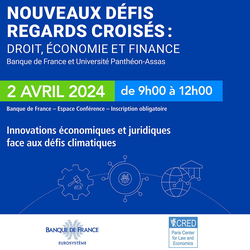
🌐follow Marie-Anne Frison-Roche on LinkedIn
🌐subscribe to the Newsletter MAFR Regulation, Compliance, Law
____
► Full Reference: M.-A. Frison-Roche, "Les voies d'innovations juridiques face aux nouveaux "défis climatiques" ("Innovative legal solutions to the new "climate challenges""), in C. Arnaud, O. de Bandt et B. Deffains (dir.), Nouveaux défis - Regards croisés : Droit, Économie et Finance. Quel Droit face au Changement Climatique ? (("New challenges - Crossed perspectives : Law, Economics and Finance. What Law in the Face of Climate Change?"), Banque de France (French Central Bank) and CRED/Paris Panthéon-Assas University, Paris, Centre de Conférence de la Banque de France, April 2, 2024
____
🧮See the full programme of this event
____
🔲see the slides, basis of this conference (in French)
____
► Summary of this conference: In response to the question of how the Law can produce 'innovations' to meet the 'climate challenges', the process is based on the three traditional sources of Law, which are, firstly, laws and regulations, secondly, the commitments of individuals, mainly contracts, and thirdly, court rulings.
At first sight, the Law in its traditional conception and practice is weak in the face of climate change. This weakness is inherent in the nature of climate change, which is at once future, global and systemic, in the face of these three sources of Law, which do not address all three dimensions at once. The scale of the legal innovation required to ensure that one or more articulated sources can grasp the future, the global and the systemic is therefore clear. And yet this is what is happening.
As far as laws and regulations are concerned, they do not seem very appropriate because they are, by their very nature, a territorial limit, and international treaties are very difficult to negotiate. The interweaving of European regulations, for example the CSRD and the CS3D, which mirror each other, may be more effective. As far as 'commitments' are concerned, a concept which in Law is not very precise outside of contracts and liability cases📎
But a major change has occurred with the emergence of a new branch of law: the Compliance Law, a teleological branch of Law whose legal normativity is lodged in the Monumental Goals📎
In this global, systemic, extraterritorial perspective, the object of which is the future - Compliance Law is, moreover, rejected by many legal experts - the legislative innovation is major. Indeed, the law of 23 March 2017, known as "Vigilance" designated large companies, because they are "powerful", because they are "in a position to act" to "detect and prevent" breaches of the environment and human rights. The 2017 law copied the "compliance tools"📎
Only large companies are subject to the Compliance Law, notably the Vigilance Law, since they are the only ones in a position to act, in this case "parent companies or principals", and borders are no longer limits since the obligation, creating personal liability for the company📎
On the second point, that of commitments, we are only at the beginning. Judges do not transform ethical statements into "unilateral legal commitments", and vigilance does not transform company law into co-management. But contracts do form a global network through which companies adjust their various legal obligations. This is why arbitrators, the only "global judges", will soon be involved in this systemic litigation📎
But the most innovative aspect undoubtedly comes from the courts. Perhaps and notably in France because it is from where we least expect it, the civil courts, that the imagination comes, but also the guarding of the great principles of the Rule of Law, because for the moment the case law is reasonable. This innovation has not come about proprio motu: the judges are not taking action, it is the NGOs that are conducting a kind of litigation policy, systematically giving formal notice to the major energy companies, but also to the major banks and insurers on climate issues, alleging non-compliance with their vigilance plans. The interim relief judge at the Paris Court of First Instance must then provide answers in systemic disputes, of which the so-called "Total Uganda"📎
The courts are demonstrating a great deal of innovation. The Court of First Instance's interim relief judge has appointed amici curiae📎
In conclusion, Law is in the process of being rebuilt through a new branch of Law, Compliance Law, whose the very purpose, as an extension of and going beyond Regulatory Law📎
________
🕴️M.-A. Frison-Roche, 📝What a commitment is, in 🕴️M.-A. Frison-Roche (ed.), 📘Compliance Obligation, 2024.
🕴️M.-A. Frison-Roche, 📝Compliance Monumental Goals, beating heart of Compliance Law, in 🕴️M.-A. Frison-Roche (ed.), 📘Compliance Monumental Goals, 2023.
🕴️M.-A. Frison-Roche (ed.), 📘Compliance Tools, 2021.
🕴️M.-A. Frison-Roche (ed.), 📘Compliance Obligation, 2024, of which a chapter is dedicated to "International Arbitration in support of the Compliance Obligation".
🕴️M.-A. Frison-Roche, 🚧Compliance contract, compliance clauses, 2022 ; 🕴️M.-A. Frison-Roche (ed.), 📘Contrat and Contract, 2024.
🕴️N. Cayrol, 📝L'amicus curiae, mesure d'instruction ordinaire, 2022.
On the creation on the new 5-12 Chamber, Contentieux émergent – Devoir de vigilance et responsabilité écologique see 🕴️J. Boulard, 💬Contentieux systémique : "Il est important, pour les magistrats, de rester au plus près des réalités" (Systemic litigation: "It is important for judges to remain as close as possible to reality"), March 28, 2024.
🕴️M.-A. Frison-Roche, 💬"Nous voyons émerger aujourd’hui le contentieux systémique" ("We are now seeing the emergence of the Systemic Litigation"), March 28, 2024 ; 🕴️M.-A. Frison-Roche, Coordination and animation of cycle of conference-debates 🧮Contentieux Systémique Émergent (Emerging Systemic Litigation).
🏛️Conseil d'État (French Council of State) and 🏛️Cour de cassation (French Court of cassation), 📗De la régulation à la compliance : quel rôle pour le juge ? (From Regulation to Compliance: what role for the Judge?), 2024; 🕴️M.-A. Frison-Roche, 🚧The deployment of Regulatory Law through Compliance Law in the European project, 2023 ; 🚧Compliance Law loses the ties of Regulation Law but retains its principles : consequences for companies, 2018 ; 🚧From Regulation Law to Compliance Law, 2017.
🕴️M.-A. Frison-Roche, 📝Le rôle du juge dans le déploiement du droit de la régulation par le droit de la compliance et ;🕴️Fr. Ancel, 📝Quel rôle pour le juge aujourd’hui dans la compliance ? Quel office processuel du juge dans la compliance ?, in 🏛️Conseil d'État et 🏛️Cour de cassation, 📗De la régulation à la compliance : quel rôle pour le juge ?, 2024 ; 🕴️Fr. Ancel, 📝Le principe processuel de compliance, un nouveau principe directeur du procès ?, in M.-A. Frison-Roche (dir.), 📕La juridictionnalisation de la Compliance, 2023 ; 🕴️M.-A. Frison-Roche, 📝Le Juge requis pour une Obligation de Compliance effective, in 🕴️M.-A. Frison-Roche (dir.), 📕L'Obligation de Compliance, 2024.
Feb. 1, 2024
Teachings
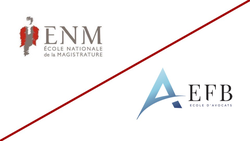
🌐follow Marie-Anne Frison-Roche on LinkedIn
🌐subscribe to the Newsletter MAFR Regulation, Compliance, Law
____
► Full Reference: F. Ancel & M.-A. Frison-Roche, Droit de la compliance (Compliance Law), École nationale de la magistrature - ENM (French National School for the Judiciary), in collaboration with the École de Formation professionnelle des Barreaux du ressort de la cour d'appel de Paris - EFB (Paris Bar School), Paris, February 1 and 2, 2024
This teaching is given in French.
____
____
► Presentation of the Teaching: The aim of this two-day conference is to enable judges and lawyers to grasp the issues, objectives and methods that define Compliance Law as it is practised in companies.
The speakers will illustrate the growing trend towards litigation, which is difficult to reconcile with the supranational dimension, or even indifference to territories, for example when disputes concern systemic climate or digital issues: the result is a renewal of the role of the judge and the role of lawyers.
This must be set against the renewal of the role and operation of companies themselves.
This is analysed from the perspective of Civil Law, in particular Contract Law and Liability Law. Company Law and Criminal Law are also addressed, as well as the way in which the legal system now integrates governance, regulation, climate and digital issues and the smooth operation of financial markets through Compliance techniques.
____
► Organisation of the Teaching: This conference is divided into two parts.
The first day is designed as a presentation of the major themes through which Compliance Law crosses the branches of traditional Law. The speakers will be professors of Law who will successively summarise the branches of Law and put into perspective the way in which Compliance imperatives give rise to new situations, new difficulties and new solutions.
This enables the second day to focus on practical and topical issues and to debate controversial questions between people of different sensibilities. The participants tend to be judges, members of regulatory authorities, lawyers, members of associations and so on.
____
► Enrolment procedure: The course is open to all judicial and consular magistrates, as well as lawyers.
Registrations can be made directly with the ENM or with the EFB.
____
► Speakers :
🎤François Ancel, Judge at the Première Chambre civile de la Cour de cassation (First Civil Chamber of the French Court of cassation)
🎤Thomas Baudesson, Attorney at the Paris Bar, Partner at Clifford Chance
🎤Guillaume Beaussonie, Full Professor at Toulouse 1 Capitole University
🎤Jacques Boulard, Premier Président de la Cour d’appel de Paris (First President of the Paris Court of Appeal)
🎤Marie Caffin-Moi, Full Professor at Paris Panthéon-Assas University
🎤Malik Chapuis, Judge at the Tribunal judiciaire de Paris (Paris First Instance Civil Court)
🎤Lucie Chatelain, Advocacy and Litigation Manager - Civil Liability of Parent Companies, Sherpa
🎤Jean-Benoît Devauges, Directeur Juridique, Ethique et Gouvernance des entreprises (Legal, Ethics and enterprises governance Director), MEDEF
🎤Marie-Anne Frison-Roche, Professor of Regulatory and Compliance Law, Director of the Journal of Regulation & Compliance (JoRC)
🎤Arnaud Gossement, Attorney at the Paris Bar, Partner at Gossement Avocats
🎤Thibault Goujon-Bethan, Full Professor at Jean Moulin Lyon 3 University
🎤Christophe Ingrain, Attorney at the Paris Bar, Partner at Darrois Villey Maillot Brochier
🎤Isabelle Jegouzo, Director of the Agence française anticorruption - AFA (French Anti-Corruption Agency)
🎤Anne-Valérie Le Fur, Full Professor at Versailles Saint-Quentin-en-Yvelines University
🎤Charlotte Michon, Attorney at the Paris Bar, partner at Charlotte Michon Avocat
🎤Jean-Baptiste Racine, Full Professor at Paris Panthéon-Assas University
🎤 Jean-Christophe Roda, Full Professor at Jean-Moulin Lyon 3 University
🎤Jérôme Simon, 1er Vice-Procureur Financier (First Financial Vice-Prosecutor)
____
🧮read below the programme put together and organised by François Ancel and Marie-Anne Frison-Roche, as well as the reports of each presentation⤵️
Oct. 2, 2023
Conferences

♾️follow Marie-Anne Frison-Roche on LinkedIn
♾️subscribe to the Newsletter MAFR Regulation, Compliance, Law
____
► Full Reference: M.-A. Frison-Roche, Participation à la Table ronde "Normes de Responsabilité Sociale des Entreprises (RSE & Devoir de Vigilance)" (Participation in the Round Table "Corporate Social Responsibility Standards (CSR & Duty of Vigilance)"), in Fribourg University, Journée du Droit, Fribourg University, Pérolles site, room C230, October 2, 2023.
____
🧮see the full programme of this event
🎥watch the video of this event (in French)
____
🌐read the report written in French with photos, tags and links on LinkedIn and also with links to each the speech
____
► General presentation of the event : This conference, build around 4 presentations and a debate between the speakers and then with the audience, aimed at explaining and understanding this fundamental movement and the new texts that express it in Switzerland, even if it is French law, such as the so-called 'Vigilance' law of 2017 and the draft European CS3D directive, because on the one hand it is a movement that begins with legal technique and on the other hand the texts in question are extraterritorial in scope, if only because of the notion of 'value chain'. In the first part of this round table, and to set the scene, I will outline the origin and content of the French 'Vigilance' law, the way in which the draft directive draws heavily on it, its relationship with Compliance Law, of which it constitutes the 'advanced point', and the decisive role it gives to the courts, in the general movement of the jurisdictionalisation of compliance. The purpose of this is to allow the discussion to get underway.
🕴️Idris Abdelkhalek, PhD candidate and lawyer, introduced the speakers and led the debate between them and the audience. He took questions from the audience on the intensity of the obligation weighing on companies, in particular between civil liability and criminal liability, between the obligation of means and the obligation of result, and on the way in which the duty of vigilance is applied to specific sectors such as defence.
____
► Presentation of my speech : the subject of which was Presentation of French Vigilance law, European perspective and European Compliance System. My presentation was divided into four points. Firstly, I outlined the state of Law in France, in the novelty represented by the 2017 law known as the "Vigilance" law, whose principles are simple and strong, principles that are situated in the aims pursued, and the way in which this law inspires what is currently being negotiated: the CS3D Directive.
Secondly, I stressed the need for companies to master these often technically complicated corpus, especially if we take into account the link between Vigilance and the CSRD directive on sustainability reporting and extra-financial information.
Thirdly, I have shown that an overall understanding can nevertheless be achieved, and that the technical nature of the 'tools' is better mastered if we place the duty of vigilance within Compliance Law, of which it constitutes the 'advanced point'. All of this anchors its legal normativity in the 'Monumental Goals' it serves, which in Europe are humanistic, since the aim is to protect, now but above all in the future because it is a branch of ex ante Law, the human beings involved in the systems (banking, finance, energy, digital, climate, etc.).
Fourthly, I emphasised that this understanding enables everyone to play their part: political and public authorities, businesses and stakeholders. Even more, and at the heart of the matter, the judge plays an essential role, even in countries with so-called 'continental' Law. I have used current cases as examples. This is just the beginning, and judges need to train, specialise and work in dialogue to achieve this.
____
► Presentation of the other speakers contributions :
🕴️Marion Paradas, Ambassador of France to Switzerland and Liechtenstein, opened the conference and gave a general presentation of the theme. Ambassador Marion Paradas presented the international challenge represented by Law, illustrated here by the duty of vigilance. She emphasised that this is a major issue, both now and in the future, for Swiss companies and French companies based in Switzerland, particularly as this duty extends throughout the "value chain" and in view of the CS3D directive, which will also have consequences for both.
🕴️Isabelle Chabloz Waidacher, Professor at the Faculty of Law in Fribourg and holder of the Chair of Economic Law at the University of Fribourg, gave a Presentation of Swiss Law. In particular, she emphasised the state of Swiss Law, which could have gone further than the 2017 French law known as the "Vigilance" law if the popular initiative reference had led to the adoption of a law, and which currently focuses more on information and transparency obligations, with CSR taking over from there. But she stresses that the reality of value chains will force Swiss companies to take into account the requirements of the European directive currently being adopted.
🕴️Renaud Roussel, Managing Director of Colas Switzerland, presented an entrepreneurial view of the subject. He began by outlining the concrete steps taken by his industrial group in Switzerland and around the world to implement its commitments to protect the environment, for example by ensuring the proper use of materials used in road construction. He also stressed the importance of human rights, particularly in labour relations, in the context of CSR and vigilance. He went on to point out that it was not always easy for a large company to meet its own requirements, or the requirements imposed on it by the law, because in the construction and public works sector in particular it is often small companies that are competing, competitors who do not bear the costs of such obligations.
________
Sept. 28, 2023
Conferences
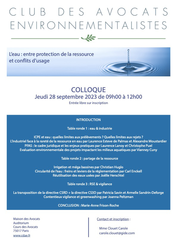
♾️follow Marie-Anne Frison-Roche on LinkedIn
♾️subscribe to the Newsletter MAFR Regulation, Compliance, Law
____
► Full Reference: M.-A. Frison-Roche, "Conclusion", in Club des avocats environnementalistes, L’eau : entre protection de la ressource et conflits d’usage, Maison des Avocats, Auditorium, September 28, 2023.
____
🧮see the full programme of this event
________
June 14, 2023
Conferences
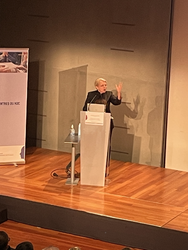
🌐follow Marie-Anne Frison-Roche on LinkedIn
🌐subscribe to the Newsletter MAFR Regulation, Compliance, Law
____
► Full Reference: M.-A. Frison-Roche, "L'esprit des Lois en matière de vigilance" ("Spirit of Law in Vigilance (Due Diligences) matters"), in Haut Conseil du Commissariat aux Comptes (H3C), Réalités et défis de la CSRD - Perspectives du devoir de vigilance, Paris, 14 June 2023.
____
🎥watch the video of a part of the speech (in French)
____
🧱read the description of the speeches of other speakers of this panel (in French)
____
The speech took place during the third-round table devoted to the Perspectives du devoir de vigilance (Perspectives of the duty of vigilance), the first round table having been devoted to the lessons that the DPEF can provide for the CSRD, and the second to the transposition work of the CSRD.
🧮See the full programme of this annual event (in French)
____
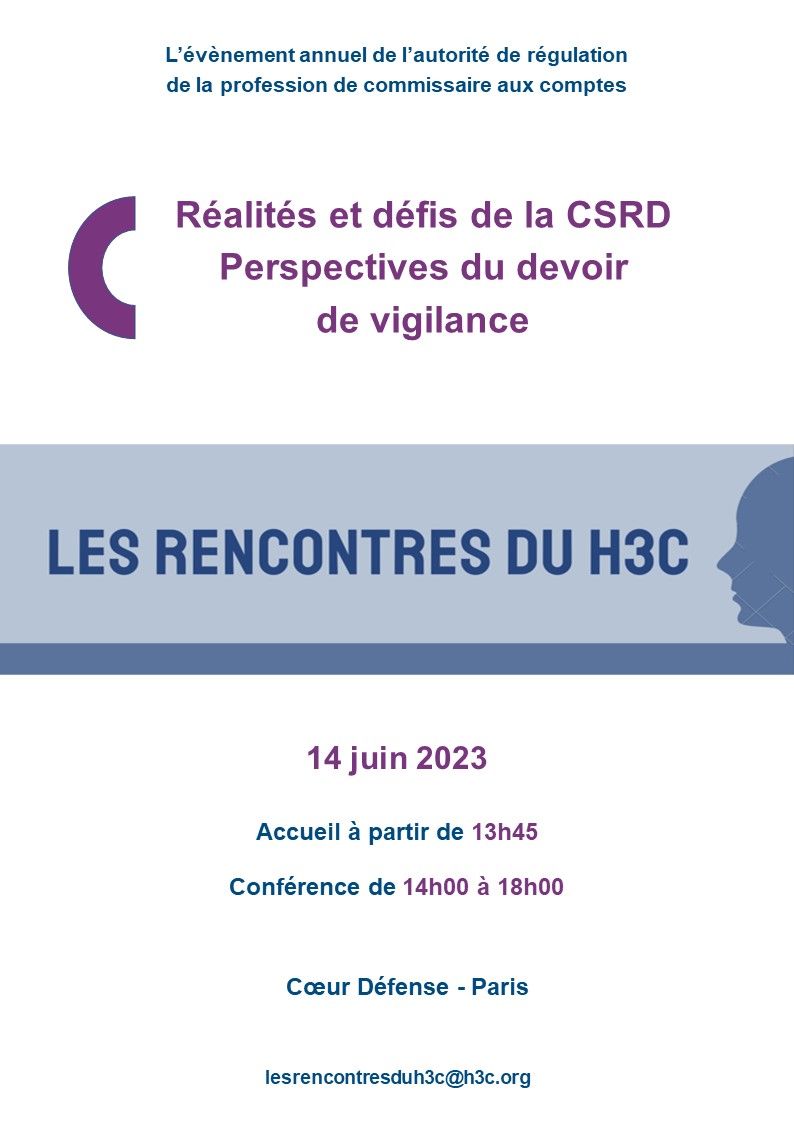
► English summary of the speech: In consideration of and in addition to what has been said, explained and even affirmed by other speakers, I have emphasised that 'vigilance" laws is not a 'regulation' like any other, but the leading edge of a very vast movement, Compliance Law, in which the 2017 French law is the driving force. For its application, the Judge, who is at the centre because of the will of the Legislator, is already taking into consideration the CS3D, the twin text of the CSRD.
The texts must not be seen in isolation. If we isolate them from each other, they become almost incomprehensible, their meaning appearing uncertain, even threatening: we need to understand the spirit of these texts, which are indeed new, because they aim to provide answers to the new world we have entered. We must all rejoice in this political ambition, which is taking a legal form, and work to make it efficient: Legislators, companies, auditors, Regulators and Judges.
If we do not stop at the letter, which would be to reduce Compliance to conformity, whereas Compliance Law, particularly Vigilance, is the extension of Regulation, finds its meaning in the Goals, we see that the French law of 2017, known as the "Vigilance law", which copies all the techniques of the French law known as "Sapin 2", gives goals simple to understand to the companies subject to the Legislator's will: detect and prevent environmental and human rights abuses in the value chains.
The logic is therefore Ex-Ante.
This Ex-Ante logic is retained by the CS3D directive.
The Judge is central to it. But the responsibility which the NGOs will ask him to trigger is itself an "Ex Ante responsibility", the Compliance trials being like "accountability" trials, to ensure that companies act in accordance with the Goals set by the Legislator.
This is transforming the role of the Judge, who must find effective solutions for the future. The discussion and the adversarial principle will become more important. Mediation will be encouraged. Stakeholders and the company will have to work together, and this method, which was intended by the Legislator for drawing up the vigilance plan, will be continued in the supporting legal proceedings.
This will also transform the company, and the role played by those who accredit the information on the company's actions and long-term strategies: auditors therefore have a central role to play.
________